8 years ago
#WPOfavs feature: Manuel Pita - aka @sejkko and his #sejkko_lonelyhouses.
Manuel is a Portuguese scientist. He was awarded a PhD in Artificial Intelligence and Cognitive Science from the University of Edinburgh in Scotland (UK). He currently works in the area of Complex Systems, trying to understand how nature and societies process information collectively.
Manuel grew up going back and forth between Venezuela and Portugal, and from this mix, tropical nostalgia, magical realism, minimalism and an obsession with geometry and patterns influence his artistic work deeply.
Tell us more about the series of images we featured on the WPO feed. Do you have a favourite, and why?
The first one in your feature set. The house with freckles. It has a sort of back-end story that is very close to my heart. The story has to do with the birds, that live there by the sea. They see how every day people pollute the ocean, adding more and more rubbish into it. In my imaginary story, the house does not agree with this, and asks the birds to pick bits of plastic up from the sea, and stick them to her façade. The house does not mind keeping all that plastic, if with that she can make sure our water remains pure.
When did you start taking photography seriously?
It would be hard to pinpoint a moment in which I felt things got more serious. Maybe it was recently. Since I started in instagram, I advocated for the mobile-only wave that many follow. When I am out taking photos, my mobile phone is an extension of me. I know exactly what to do with it to get the image that suits my taste best, within its limitations. Recently however, particularly after a wonderful visit to Turkey, I developed this same relationship with my DSLR camera (which I did not have before, at all). During those days in Turkey a bond between me and my camera was created. As I grab it today, I instinctively know what to do with it. I am still developing this bond.
Tell us more about your PhD in Artificial Intelligence and Cognitive Science - how do you think this has influenced your image-making?
As a child, I always wondered why bananas get black spots on them, and why the guava tree in my grandpa's garden knew when to make flowers and fruits. I also wondered why monkeys do not write encyclopaedias. These questions about nature stayed with me as I was growing up. It was because of them that I chose the path of a scientist, in AI and CogSci particularly. This, I have come to realise, is reflected in my photos. A while back, I focused on hands and masks. After many of the photos were out, I began to see I was doing a sort of study of cognition with them.
More recently, I have focused on nature, and the myriad of patterns and functions it produces constantly. The specific field in which I work today is called "complex systems" and one of the questions we have in our field concerns the mechanisms used by living organisms, and societies, to process information. Take for example two cells, that are identical, but one becomes part of a nail, while another turns to a liver cell. There is a lot of information processing done by genes and proteins to achieve this. Maybe because of my background, I have a very micro-cosmic view on nature. Somehow when I see a plant, I try to see the genes that are deciding its form and function. It is also this micro-cosmic view that has given a lot of form to the lonely houses series. In the end it is all about getting to the core of things.
Tell us about your relationship to Instagram. When and why did you start using the platform? How has your views of it changed since you joined, if at all?
I created my account in 2010, but it was not until the summer of 2012 that I really started using it as a form of diary. During the first two years I felt like a young child, very excited, and eager to learn. I identified a significant number of people who were posting content that I found absolutely fascinating. They inspired me daily, and deeply. This led me to finding ways of taking photos and editing that captured a sort of mix of those influences I resonated with the most, mixed with my own views. I believe the core of sejkko's character formed during that period. About a year ago I believe I reached some kind of inflection point, after which my own way of seeing the world and my photos became more important than the influences of the previous years. I began to feel I owned the world I was speaking about in my photos. I felt like reaching some kind of adulthood.
Instagram has grown a lot in this time. Many more people use it for a huge variety of reasons. There are even some older people in remote places that use it just to see how others portray their unknown town, and I absolutely love that aspect of it. I love how instagram has consolidated into a social network that is not just about photography. You don't see people discussing so much the depth of field, or exposure in a photo. It is more about a combination of a person's character, with a story they are telling, and their aesthetic view. That to me is priceless, and what motivates me to post every day.
I would encourage people who are starting not to follow the trends of what seems to get more engagement, but to learn how to truly own the content they produce - even if that involves a long learning period (like it did for me). Instagram becomes less fun when you see a post, and you think it could have been posted by about forty people you know.
Do you have a photographic philosophy?
I believe our reality exists in the way each of us perceives. I grew up on magical realism books in South America, my perception is highly tuned to that. Lately, I feel the camera in front of my eye is an amplifier of this way of perceiving.
What's next for you?
Maybe in these last three years I have documented sejkko's character in a broad sense. I feel the next step is to pick some elements of that character and travel deep into them. This will involve a heavy coupling between photography and writing. I would also love to be able to travel and document the lonely houses that exist away from Portugal, and bring peoples' realities into that as well, to build a world map of lonely houses, with their people, history and emotions. Finally, I want to devote more effort to raising awareness about our relationship with a few or our essential nature friends, focusing on water, and bees - both of which are being currently destroyed by human activity and lack of knowledge/responsibility.



